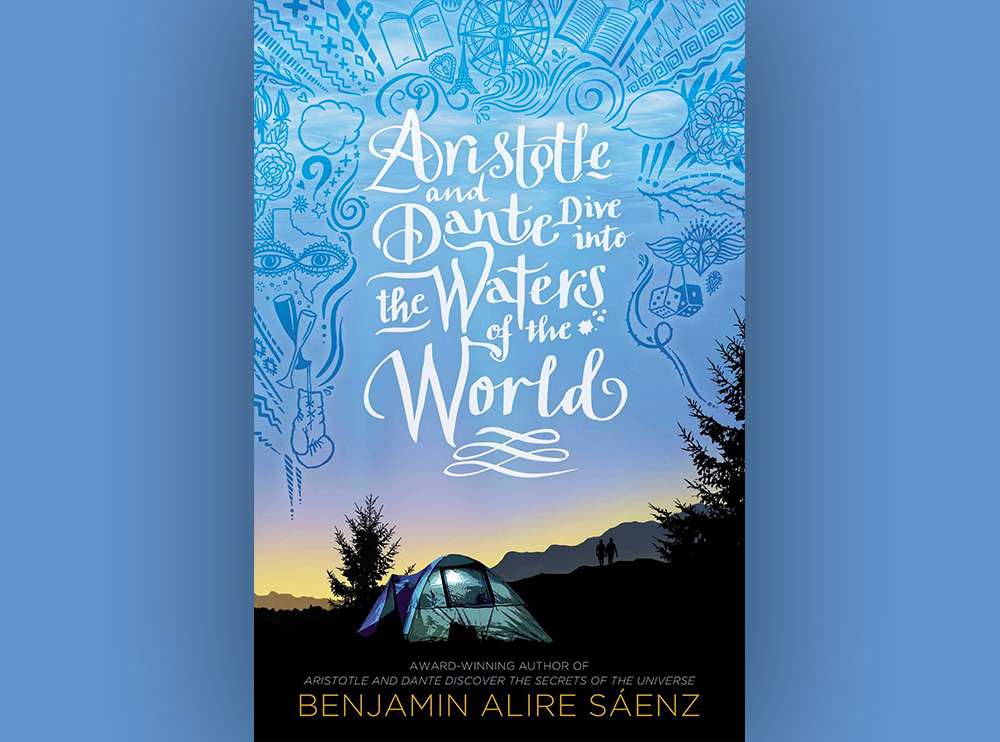Review – Aristotle and Dante Discover the Secrets of the Universe by Benjamin Alire Sáenz
Through Aristotle and Dante Discover the Secrets of the Universe, Benjamin Alire Saenz has confronted the tumult that is our teenage years with this contemporary fiction about a beautifully honest and tender friendship between Aristotle and Dante, our main characters.
The book is set in the city of El Paso, Texas, and although it spans over a year of Ari and Dante’s lives, the summer sun acts as a backdrop for a major portion of the unlikely friendship between Ari and Dante that slowly morphs into an exploration of love, of relationships with parents, of loneliness, and of friendships so intimate, they make you question who you are.
Aristotle is, well, he is a complicated person. He is lonely, he is lost, he is insecure, he is angry, he struggles to express himself, and is still trying to find, as he likes to put it, “all the secrets of the universe”. Dante, on the other hand, is the most open-hearted, happy, and unabashed person Ari has had the chance of meeting. He knows why birds exist, “Birds exist to teach us things about the sky.”(Saenz Pg 54). He reads poetry out loud, and he draws. He can get along with just about anybody and always knows the right thing to say. He cries when he feels sad, he laughs when he is happy, and most of all, he always speaks what he feels, never caring what others think. He is, as Ari likes to put it, “uncensored”.

Ari has never met a guy like Dante. In fact, in his opinion, all teenage guys are “disgusting”. But in Dante he meets an exception to the rule: “And there wasn’t anything mean about him. I didn’t understand how you could live in a mean world and not have any of the meanness rub off on you.” (Saenz Pg 19). Ari has never had a real friend before and is still learning to navigate being one, but Dante has no problems being Ari’s best friend:
“I liked the sketch,” I said.
“Why?”
“Because it looks just like my chair.”
“Is that the only reason?”
“It holds something,” I said
“What?”
“Emotion.”
“Tell me,” Dante said.
“It’s sad. It’s sad and it’s lonely.”
“Like you,” he said.
I hated that he saw who I was. “I’m not sad all the time,” I said.
“I know,” he said.
(Sáenz Pg 75)
Saenz seamlessly transforms their friendship into a heartwarming love story between two teenagers learning how to love each other in a world hostile to “boys who love other boys”. We see both Ari and Dante understand their sexuality and learn to identify with it well enough to be able to empower themselves by loving each other.
The book also focuses on the relationship between Ari and his parents, as well as the parent-child relationship in general. It shows the importance of expression, it shows how secrets can break the strongest of bonds, especially within a family. We see the way secrets threaten to taint Ari’s relationship with his parents and the mistakes parents can make in a bid to protect their children, in the most honest and exposed way possible.
The book is written in first person, from the point of view of Ari, which makes the palpability of Ari’s emotions even more pronounced. It is divided into five small parts which each begin with a small quote or a single, sneakily prophetic line that is bound to get you thinking. In each part, the tension that ties the various threads of the story together builds up even more, and, Saenz’s ability to twist the plot at just the right time is bound to keep you hooked.
The book transformed the way I look at friendships and forever changed their meaning. Ari and Dante’s friendship is the purest one I have ever come across, so whenever the twists and turns of the story threatened it, the fear I felt was palpable. Through their friendship Saenz portrays the complicated, painful, yet beautiful experience that is discovering one’s sexuality. He has created characters so vivid, that by the time the book ended, I felt like I had grown with the characters. Not just Ari and Dante, but their parents too, are characters that all the other fictional characters I come across will have to compete against. Saenz’s incredibly unique writing style is profoundly impactful in its simplicity.
However, this book is not immune to criticism. While this book does justice to the portrayal of a gay love story between two teenage boys in a small town in Texas, its subplot concerning Ari’s brother has been declared transphobic by certain authors, and if read carefully and critically, it does prove to be so. So, while this book is a good read for anyone struggling to find their place in the world, or more importantly, within themselves, it fails to even hint at intersectionality, and, much like a lot of young adult gay romances, fails to look beyond the cis-gender gay man.



